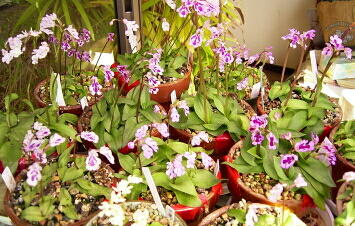 Reference book (in Japanese)
Reference book (in Japanese)  Cultivation: (1)
Cultivation: (1) 

 Hardiness:
Hardiness:
Okinawan orchis can tolerate wide range of temperatures and
tolerate near-freezing conditions. but, cannot tolerate any frost.
tolerate near-freezing conditions. but, cannot tolerate any frost.
In my greenhouse, day temperatures is 10 to 20.C (50 to 68.F),
and 5 to 10.C (41 to 50.F) at night.
and 5 to 10.C (41 to 50.F) at night.
 Light:
Light:
This orchid like bright light.
a few hours direct sunlight (weak sunlight of cold season) is
adequate.
adequate.
South or west window will normally supply sufficient light for
orchids. It should be placed behind race curtains to prevent them
from getting too much direct sunlight in the middle of the day when
the sun is very strong. (This is management in low latitude area.)
orchids. It should be placed behind race curtains to prevent them
from getting too much direct sunlight in the middle of the day when
the sun is very strong. (This is management in low latitude area.)
In the high latitude area which a cloudy day continues in winter, or
the room which faces north, healthy growth is attained by using a
fluorescent plantlight together natural light.
the room which faces north, healthy growth is attained by using a
fluorescent plantlight together natural light.
In summer, the dormant plant is of course not need light.
 Compost:
Compost:
Terrestrial orchids need lots of air space on their roots, as all
other orchids do. the orchids want a moist (not a wet) soil, also
need a permanent water supply during the growing period, the soil
must have a good water-holding capacity.
other orchids do. the orchids want a moist (not a wet) soil, also
need a permanent water supply during the growing period, the soil
must have a good water-holding capacity.
I use volcanic-ash pellets ('soil of KANUMA-Hard type'. This is
popular potting medium for Japanese terrestrial orchids growers.)
or volcanic small gravels with tiny holes to absorb water.(like
Pumis)
popular potting medium for Japanese terrestrial orchids growers.)
or volcanic small gravels with tiny holes to absorb water.(like
Pumis)
These composts are weak acidity.
It is not necessary to add limestones.
I use a mixture of some different pellets and small-round-gravels,
and not add organic materials (for example, Beech Humus or Peat.).
and not add organic materials (for example, Beech Humus or Peat.).
It is because an organic matter decomposes quickly and brought
about a bad result in the high temperature area. (However, only
Sphagnum moss can be used. Spagnum is ideal potting medium in
about a bad result in the high temperature area. (However, only
Sphagnum moss can be used. Spagnum is ideal potting medium in
my area.)
In non-organic composts, activity of Symbiotic-Fungus which uses
an organic matter as food is not expectable. Therefore, supply of
furtilizer is very important.
an organic matter as food is not expectable. Therefore, supply of
furtilizer is very important.
 Furtilizer:
Furtilizer:
Growers of this orchid must use balanced fertilizer during in
active growing period.
active growing period.
If certain kind of fertilizer is used for this plants, result is not
good. I do not understand the cause.
good. I do not understand the cause.
I use a 1/4-1/8 strength fertilizer solution at every watering.
Solid furtilizer is mixed with composts, it will become the cause by
which root rots.
which root rots.
Always flush potting composts with soft water at the end of each
month to eliminate the build up of salts.
month to eliminate the build up of salts.



